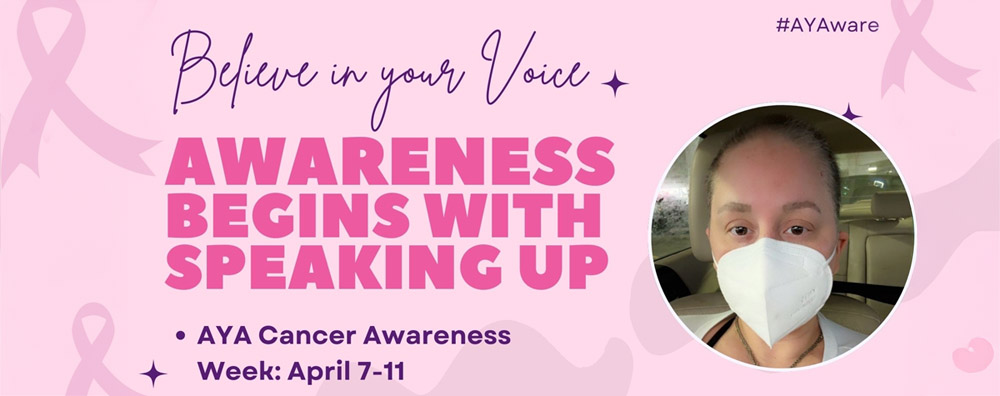For AYAs Facing Cancer, Advocacy is a Lifeline
By Sara Sandoval

The first week of April is Adolescent and Young Adult (AYA) Cancer Awareness Week—and if you've never heard of it, that's part of the problem. This year, 89,500 young people between the ages of 15 and 39 will be diagnosed with cancer in the United States. That's not a typo. That's not an obscure stat tucked into a research paper. That's real life. And it's mine.
Last week, I was in a room full of people who actually get it. “AYAs Take Chicago” was more than an event. It was a moment. It was a moment of real conversation, heartfelt truth-telling, and yes, even laughter, thanks to a magnetic host, the unmatched Kat Sass, and some much-needed music and food.
Keynote speakers Matthew Zachary and Ambreen Maan laid the groundwork, and a panel of survivors cracked open the doors to their stories loudly, proudly, and honestly. The common thread in every story? Advocacy. Self-advocacy isn't a hashtag or a talking point when you're a young adult with cancer. It's a lifeline.
 I never imagined I'd be here. I was 35, working out, dropping dress sizes, planning my wedding, and getting all the check-ups and bloodwork done to prepare for starting a family with my soon-to-be husband. I had a clean bill of health. Every test came back normal.
I never imagined I'd be here. I was 35, working out, dropping dress sizes, planning my wedding, and getting all the check-ups and bloodwork done to prepare for starting a family with my soon-to-be husband. I had a clean bill of health. Every test came back normal.
And then, just eight weeks later, I was told I had stage 4 invasive breast cancer.
Let that sink in.
From a clean scan to a terminal diagnosis in less than two months. Nothing prepares you for that. No one expects a 35-year-old bride-to-be to be scheduling chemo before traveling for their wedding. No one expects your signature long, thick hair to be falling out in clumps the week before your wedding. No one expects to have to shave their head the day before they walk down the aisle. But that was my reality.
Cancer doesn't care about timelines, milestones, or your plans for the future. And the truth is, if you're a young adult, the medical system often doesn't take you seriously. You find a lump. You're told not to worry. "It's probably nothing." "It's common to find lumps and bumps in the breast." But it wasn't common for me. And the only reason I got answers is because I didn't stop pushing. I had to speak up. I had to make noise. I had to advocate.
And just when I thought the worst news had been delivered, there was more. Because of how aggressive the cancer was, I was told I couldn't do oncology fertility preservation. That we wouldn't be able to retrieve eggs. That the option of becoming a mother the way I had dreamed was off the table. It was like getting hit with grief before I'd even had a chance to process the diagnosis.
Instead of celebrating a honeymoon or decorating a nursery, I was navigating medically induced menopause. I was watching my future change in real time, while the world around me carried on.
But here's what I've learned: advocacy doesn't end when the treatment starts. You don't stop fighting for your voice just because you're now fighting for your life. I had to remind my care team—and myself—that being a patient doesn't mean letting go of the dreams you had before the diagnosis.
I want to be a mom. I will be a mom. Maybe not in the way we first imagined, but we are exploring options. We're revisiting everything with my oncologist, checking bloodwork and imaging, and having conversations about whether it's possible to retrieve eggs down the road or if we'll need a donor. We're talking about embryo creation and what's possible.
These conversations are hard. They're emotional. But they matter. Because this is about more than cancer. It's about reclaiming control. It's about fighting for your future, even when your present is scary and uncertain.
So if you're a young adult and you find yourself in this situation—scared, confused, and feeling dismissed—here's what I want you to know: You can speak up. You can ask questions, even when they feel uncomfortable. If you sense something is off, follow that instinct. If a doctor dismisses your concern, ask again. And again. Find another voice. Find another path. You deserve to be heard.
Cancer doesn't just show up with a diagnosis. It shows up in a thousand little ways, and it changes how you're seen, how you're treated, and how you move through the world. That's why we have to keep pushing this conversation forward.
AYA Cancer Awareness Week matters. These 89,500 stories matter. And so does mine. To my medical team at Lurie Cancer Center and Northwestern Medicine, thank you. For seeing me. For listening. For showing up when I was too tired to do anything but cry. For guiding me through the storm and giving me space to ask hard questions. You've been my saving grace.
AYA cancer is real. It's growing. And it's time the world started paying attention. This week, and every week, I'll keep using my voice. Because I still believe in my future. And I still believe in my voice. And that's how we make change.
